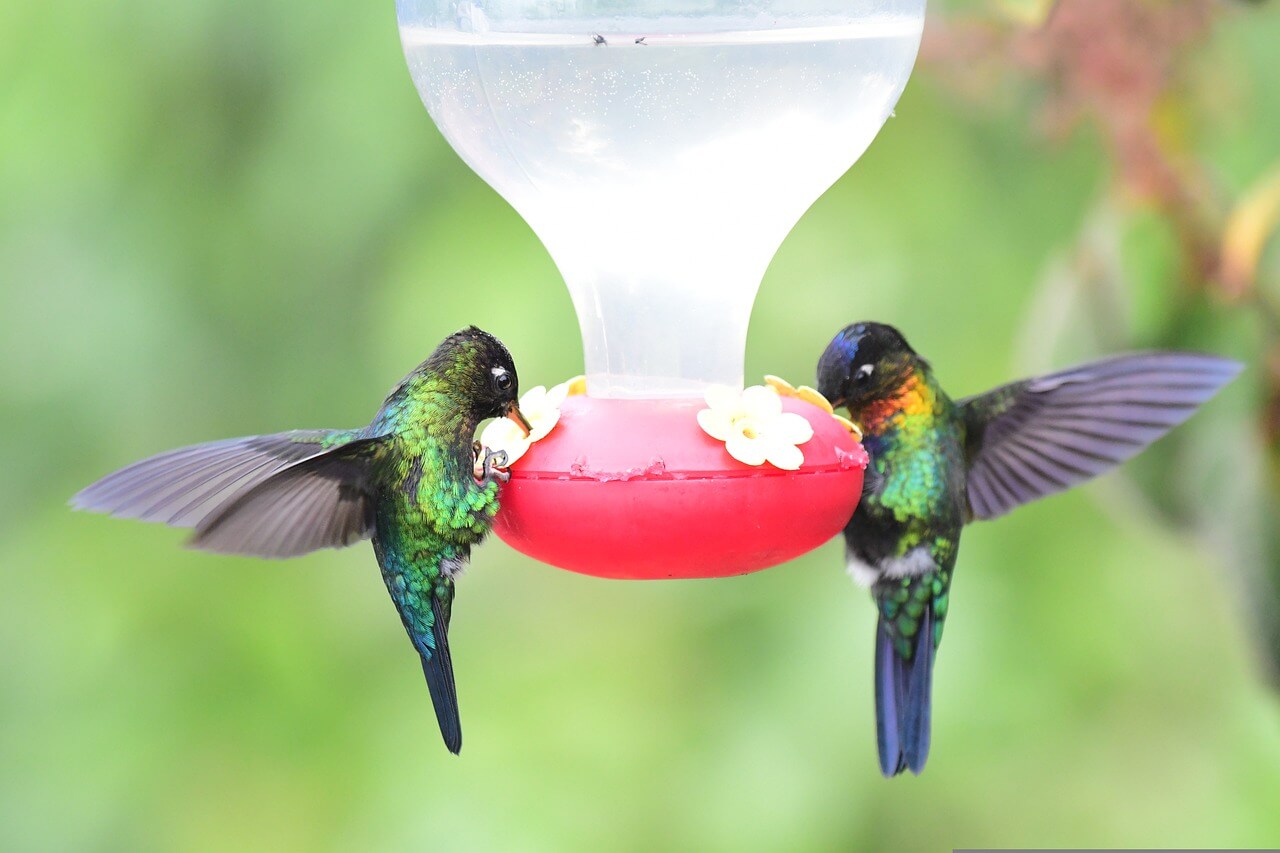Many birdwatchers put out food to attract birds and help them through food shortages. Hummingbirds will not come to birdseed, but some birders put out nectar to get these small, beautiful creatures into their yards.
However, you have to be careful with the feed you put out for hummingbirds because these birds are very sensitive.
Can Hummingbirds Drink Cold Nectar?
In terms of if hummingbirds can physically drink cold nectar, yes, they can. Hungry hummingbirds will not stop to check if the nectar is the right temperature, they will just drink it up.
However, even though they physically can drink cold nectar, there will be consequences for the health of the birds.
Hummingbirds are very sensitive to fluctuations in temperature, and drinking too-cold nectar could cause health problems.
There are actually two different thoughts on how much of an effect cold nectar will have on hummingbirds. Some people say that hummingbirds could get hypothermia from drinking cold nectar on cold late fall or early spring mornings. The Audubon Society, says that drinking cold nectar could cold-stun hummingbirds.
Another point of view is that there is no scientific study backing up that cold nectar leads to hypothermia for hummingbirds. Either way, it’s better to be safe than sorry.
Now, Hummingbirds are typically endotherms which means using their metabolic processes, they can keep a constant internal body temperature.
And according to a research paper, it is essential for endotherms to warm the food they consume – to their body temperature.
An experiment was done by the researchers in which they fed the bird a particular nectar concentration in two different temperatures: 39°C and 4°C. And they found that the hummingbirds that were fed at 4°C had to raise their metabolic rate.
Warming the food according to the body temperature of the bird may look simple, yet it’s an essential part that can cost a substantial part from the energy budget of the bird. The effect on food warming on the energy budgets of the hummingbird are especially high for those birds that live in cold regions (For instance, the broad tail and Rufous hummingbird species).
So in short, when you give a cold nectar to a hummingbird, they have to spend more energy from their energy budget to utilize the food as per their needs. Therefore, instead of giving them cold nectar, it’s a good idea to directly offer them with nectar at normal temperature.
Why Are Hummingbirds So Sensitive to Cold Nectar?
The reason why it’s so important not to give hummingbirds cold nectar is that they are very sensitive to changes in temperature, particularly the cold.
To survive the cold, hummingbirds intentionally lower their body temperatures and metabolism speed during the night to enter a state called torpor. However, that means they need to maintain equilibrium once they wake up.
After a hummingbird exits torpor, or the state of deep sleep brought on by lowering its body temperature, it needs to get food quickly that will help it get its metabolism up and regain the energy needed to survive.
Hummingbirds also have very fast metabolisms (they eat half their body weight a day) because their wings need to beat very fast to keep them airborne. That means finding the right food source is crucial, as is raising the body temperature as soon as possible after waking up to regain equilibrium.
However, cold nectar will just stun the body further and not help the hummingbird reach equilibrium again.
Hummingbirds are only able to maintain lower body temperatures because they also slow down the body’s other processes while they sleep. When they’re awake and using energy, they need to raise their body temperature as soon as possible to maintain the energy needed to survive.
If hummingbirds don’t get their body temperature up as soon as they can after waking up, then their bodies will not be able to function as they normally would once awake.
What’s The Best Temperature For Hummingbird Nectar?
While you don’t want to serve cold nectar to hummingbirds, you don’t want to put out hot nectar either.
Hot nectar is bad for hummingbirds because it can sometimes melt the feeder, causing dangerous chemicals to bleed into the nectar without you or the birds noticing. Warm or hot nectar is also a breeding ground for bacteria, and hummingbirds are very sensitive to microbes.
The best temperature for hummingbird nectar is room temperature nectar.
In the wild, hummingbirds eat nectar from plants that have been sitting out in the sun, so slightly warm nectar is fine.
How Can You Keep Nectar Warm When It’s Cold Outside?
The paradox is that hummingbirds can’t drink cold nectar but putting out nectar is most important during cold periods such as the early spring and late fall when natural sources of nectar are less common. What is a bird lover supposed to do?
Luckily, there are a few suggestions for keeping hummingbird nectar at the right temperature for these birds. You can:
- Take your feeders in overnight
- Add an incandescent bulb
Usually, nectar doesn’t get too cold when it sits out during the day, even during chillier spring or fall mornings. The real problem happens when temperatures drop overnight and then the hummingbirds feed on the cold nectar first thing in the morning.
You can fix this by taking your feeders in every night, as long as you remember to put them out early every morning so the hummingbirds can feed once they wake up.
If you know that you can’t wake up early every day, then moving the feeders every night is not the best solution because hummingbirds need nectar the most first thing in the morning. In that case, you can hang an incandescent light bulb near the feeder.
Incandescent light bulbs are bulbs that give off heat as well as light, which helps keep the nectar in your feeder warm for visiting hummingbirds. Plus, they tend to be red, and hummingbirds are attracted to the color red.
Setting up your feeder with an incandescent light bulb may require some extra effort on your part, but these light bulbs are affordable and can solve your problem of too-cold nectar without requiring you to get up early in the morning.
Final Thoughts
Hummingbirds can drink cold nectar, and they will do so if they are hungry, but it is not the best choice for their bodies.
Hummingbirds are very sensitive to temperature changes because they intentionally lower their body temperature each night to survive the cold. If the first thing they eat in the morning is also cold, it makes it very hard for their organs to raise their body temperatures high enough to survive the day.
To get around the problem of cold temperatures in your feeder, either bring your feeders in overnight or equip them with a heating incandescent bulb.
Learn More:


